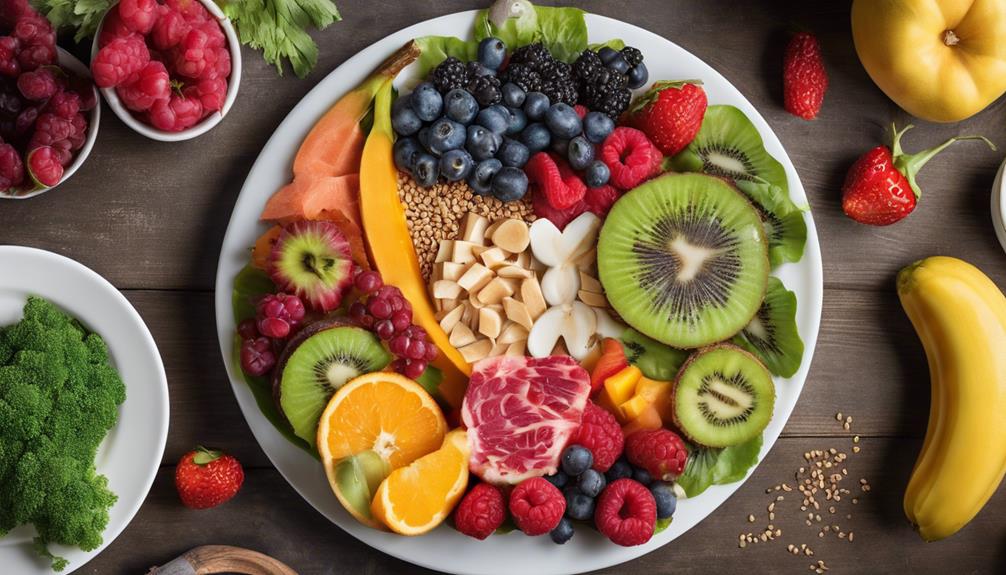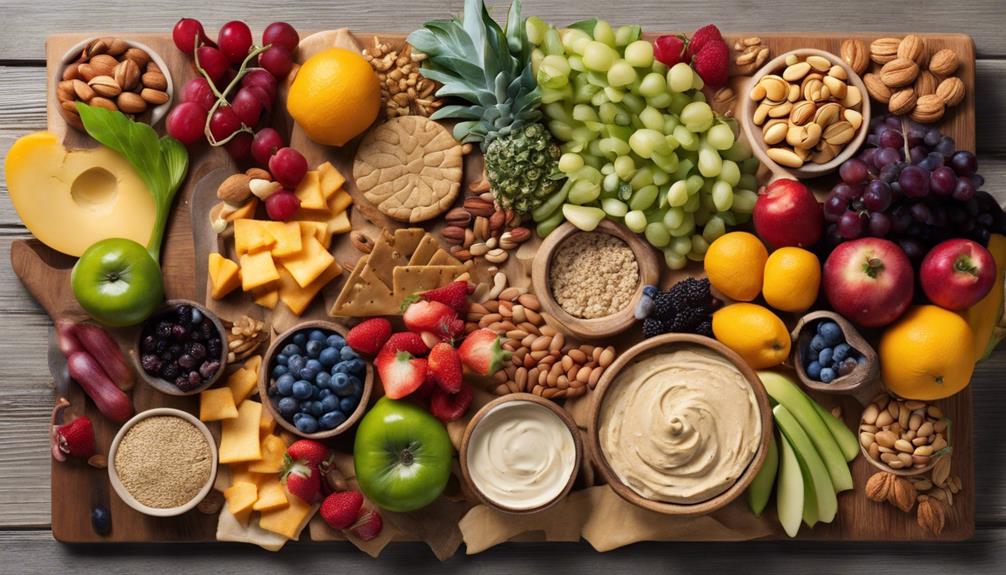As we journey through the realm of losing weight while breastfeeding, we are greeted with a fascinating discovery about the intricate balance needed to lose pregnancy weight while also providing optimal nutrition for our babies.
With the fusion of science and practicality, we unravel the secrets of a healthy diet that not only aids in weight loss but also supports lactation.
Stay tuned for essential tips that will empower us on this journey towards achieving our desired health goals.
Key Takeaways
- Stay hydrated with water and clear fluids for milk production and health.
- Choose nutrient-dense foods for energy, health, and weight management.
- Balance calorie intake with nutrient-rich foods for postpartum health.
- Opt for smart snacking with nutrient-dense options and healthy fats.
Importance of Hydration
Ensuring adequate hydration is essential for maintaining milk production and supporting overall health during breastfeeding. Staying hydrated plays a crucial role in the success of lactation. When we stay hydrated, our bodies are better equipped to produce an ample milk supply for our little ones.
Water is a simple yet powerful tool in this process. It not only helps prevent dehydration but also aids in digestion, circulation, and nutrient absorption, benefiting both the mother and baby. Dehydration can hinder milk production, potentially impacting breastfeeding success.
Clear fluids such as water, herbal teas, and milk are excellent choices to keep hydration levels ideal while breastfeeding. By prioritizing staying hydrated with these clear fluids, we can support our bodies in the incredible journey of nourishing our babies through lactation.
Nutrient-Dense Food Choices

Opting for nutrient-dense foods is important for supporting excellent health and weight management while breastfeeding. By choosing foods rich in essential nutrients, you can nourish both yourself and your baby. Including iron, calcium, and vitamin D in your diet is vital for maintaining overall health during this period. Fiber-rich foods like legumes, nuts, seeds, and whole grains can aid digestion and provide a feeling of fullness, supporting postpartum weight management. It's important to prioritize balanced meals that contain carbohydrates, proteins, and fats to sustain your energy levels, promote milk production, and aid in post-pregnancy weight loss.
—
| Nutrient-Dense Food Choices | Benefits | Examples |
|---|---|---|
| Fruits and Vegetables | Rich in vitamins, minerals, and antioxidants; aid in weight management | Berries, spinach, bell peppers |
| Lean Proteins | Essential for tissue repair and muscle growth; help with satiety | Chicken breast, tofu, lentils |
| Whole Grains | Good source of fiber and energy; support digestion | Quinoa, brown rice, oats |
—
Balancing Calorie Intake
Moving from focusing on nutrient-dense food choices, we now shift our attention to the significance of balancing calorie intake while breastfeeding. For breastfeeding moms on a weight loss journey, it's essential to consume an additional 450-500 calories per day to support milk production and energy needs. Balancing calorie intake is key to healthy postpartum weight loss.
To achieve this, opt for nutrient-dense foods like fruits, vegetables, lean proteins, and whole grains. These choices not only meet your increased caloric needs but also provide essential nutrients for you and your baby. Avoid empty-calorie foods high in sugar and unhealthy fats, as they can impede your weight loss progress and overall health.
Consulting with a healthcare provider or nutritionist can help create a personalized meal plan tailored to your needs. Pairing a healthy diet with moderate exercise can further enhance your weight loss journey while maintaining optimal energy levels for both you and your baby.
Smart Snacking Strategies

When aiming to make healthier snack choices while breastfeeding, prioritize nutrient-dense options like Greek yogurt, nuts, and fruits to support weight loss and maintain energy levels.
To snack smartly during this delicate period, consider the following strategies:
- Opt for nutrient-dense snacks rich in vitamins and minerals to support your health and weight loss goals.
- Avoid high-sugar and processed snacks that can lead to energy crashes and unstable blood sugar levels.
- Include healthy fats like avocado or nut butter in your snacks for increased satiety and essential nutrients.
- Plan ahead by having convenient snacks readily available, such as pre-cut veggies or homemade energy bars, to prevent reaching for unhealthy options.
- Practice mindful snacking by listening to your body's hunger cues and choosing whole, unprocessed foods for top-notch nutrition and sustained energy levels.
Consulting With Nutrition Experts
Consult with a nutrition expert, such as a registered dietitian nutritionist, for personalized guidance on maintaining a healthy diet while breastfeeding. These experts can tailor a balanced eating plan to meet your specific needs and assist in achieving your weight loss goals.
By incorporating nutrient-rich foods like lean proteins, colorful fruits and vegetables, and whole grains, you can nourish both yourself and your baby effectively. Nutrition professionals offer valuable advice on essential vitamins and minerals important for your well-being and your baby's development during breastfeeding. Their personalized guidance helps address dietary considerations unique to this period, ensuring you make informed choices.
Consulting with a nutrition expert provides a solid foundation for your journey toward better health and weight management while breastfeeding. Trust their expertise to navigate the complexities of nutrition, offering you the support and knowledge needed to thrive during this important time.
Frequently Asked Questions
What Is the Fastest Way to Lose Weight While Breastfeeding?
We focus on a healthy diet filled with nutrient-rich foods like fruits, veggies, lean proteins, and whole grains. Avoid crash diets or extreme calorie cuts. Gradually add moderate exercise like walking. Stay hydrated, rest enough, and seek professional guidance for safe weight loss while breastfeeding.
What Should I Eat a Day to Lose Weight While Breastfeeding?
For weight loss while breastfeeding, we focus on nutritious foods to support milk production and energy needs. Our diet includes fruits, veggies, lean proteins, whole grains, and healthy fats. Staying hydrated is key, and guidance from healthcare providers is valuable.
How Can I Lose Weight While Maintaining My Breast Milk Supply?
We balance weight loss with milk supply by gradually cutting 250-500 calories daily and focusing on nutrient-rich foods. Monitoring baby's weight gain and hydration is key. Consult experts for personalized advice.
How to Lose 20 Pounds in a Month While Breastfeeding?
Losing 20 pounds in a month while breastfeeding is not advised as it can impact milk supply and quality. Focus on gradual weight loss of 1-2 pounds per week by eating nutrient-dense foods, staying hydrated, and seeking personalized guidance from healthcare providers.
Is It Safe to Follow a Postpartum Diet Plan While Breastfeeding?
Following a postpartum diet plan while breastfeeding is essential for new mothers. By including postpartum diet plan breastfeeding essentials such as lean protein, fruits, vegetables, and whole grains, mothers can ensure they are getting the necessary nutrients without affecting their milk supply. It is safe to follow a well-balanced postpartum diet plan while breastfeeding.
Conclusion
To summarize, maintaining a healthy diet while breastfeeding is key to achieving weight loss goals. Remember to stay hydrated, choose nutrient-rich foods, and balance your calorie intake to support milk production and energy levels.
Don't forget to snack smartly and seek guidance from nutrition experts when needed. By following these essential tips, you can reach your weight loss goals while ensuring you and your baby remain healthy and nourished.
So, keep calm and milk on!









